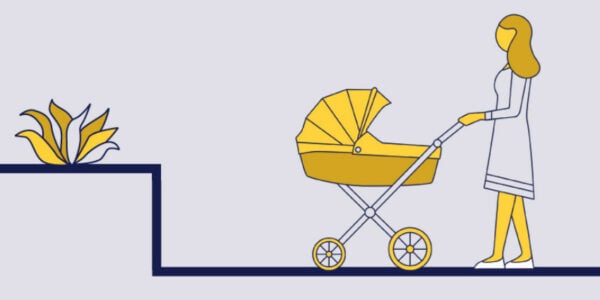About this review
This rapid evidence review aims to identify key messages from research concerning birth parent and professional perspectives on pre-birth assessment and the removal of infants at birth.
This paper is linked to Born into care: newborns in care proceedings in England (2018) and Born into care: newborns and infants in care proceedings in Wales (2019), published by Nuffield Family Justice Observatory, which looked for the first time at the number of newborns subject to care proceedings in England and Wales, using population-level data held by Cafcass. The number of newborns subject to proceedings prompted considerations and questions about, among other things, practice in relation to pre-birth assessments and removal at birth and the legal framework and court decision making in such cases. A separate paper will report on court decisions in relation to pre-birth assessments and removal at birth.
Executive summary
When there are safeguarding concerns regarding an unborn child, local authorities and related agencies can intervene during pregnancy. Such interventions aim to assess the risk to the infant following birth and mitigate potential issues by providing tailored support to the parent/s. If the local authority determines that the concerns are so great that following birth an infant cannot remain safely in his or her parents’ care, action may be taken to remove the baby.
In 2018, Nuffield Family Justice Observatory (Nuffield FJO) published Born into care, (Broadhurst et al 2018) the first ever national study of newborn babies (under one week old) in the family justice system in England. The study found that in 2007/8, care proceedings were issued with respect to a total of 1,039 newborns (32% of all cases involving infant age under one year). By 2016/17, this number had more than doubled at 2,447 newborns (42% of all infant cases).
Whilst Born into care Wales (Alrouh et al 2019) demonstrated a similar picture in Wales with increasing proportion of infant cases issued close to birth, the incidence rate was even higher and has more than doubled between 2015 and 2018 from 43 to 83 newborns per 10,000 live births
Given the vulnerability of infants and their mothers in the immediate post-natal period, issuing care proceedings at or close to birth is fraught with moral, ethical and legal challenges – and without effective, timely assessment and support during pregnancy, intervention at birth is likely to be poorly planned and can result in instability for the new baby and huge distress for family members. Despite the complexity surrounding this practice, there is scant reference to either pre-birth assessment or removals at birth in national statutory guidance.
This rapid evidence review aims to identify key messages from research concerning birth parents’ and professionals’ experiences and perspectives of pre-birth assessment and infant removal at, or soon after, birth. It aims to identify and summarise consistent key messages and provide an insight into system-level challenges. A total of 27 papers (published between 1990 and 2018) were included in the final review. The studies were primarily conducted in England and Australia, but also in Canada, USA, Northern Ireland and Scotland. Most were qualitative (derived from focus groups, questionnaires and interviews with professionals and birth parents) and were largely focused on birth mothers in the community, although two studies involved removals at birth from mothers in prison. A substantial proportion of literature is based on the perspectives of birth mothers with drug and alcohol problems.
Key messages across the literature
When birth parent (typically birth mother) perspectives on pre-birth assessment and removal of infants at birth are sought, it results in some difficult messages for policy and frontline practice. However, what is notable from this review is the extent to which professional and family perspectives cohere; studies report similar messages, whether they came from birth mothers or professionals.
Reading across the literature some consistent and important key messages, of immediate relevance for practitioners, policy makers and researchers, were identified:
i. Delayed response and insufficient time for robust pre-birth assessment
A shortened window for assessment – which appears to be due to unborn babies being considered a lower priority than other children – provides insufficient time for parents and professionals to make changes/support change in parenting capacity, promote the health and wellbeing of the unborn child and potentially divert cases from care proceedings.
The review indicates that frontline agencies need to ensure a consistent and earlier response to pregnancy to ensure that mothers and fathers and wider family members are given support at a timely point, which may catalyse change. However, workers may not always possess enough knowledge or access to guidance and tools to support effective early assessment and intervention in pregnancy.
ii. The importance of effective, collaborative relationships
Within the literature, professionals and birth families valued practice predicated on trust, honesty and openness. Birth mothers were sensitive to feelings of being judged by practitioners, and both health professionals and social workers placed significant emphasis on non-judgemental practice in building more positive relationships. Professionals recognised the importance of both collaborative working and effective information sharing.
iii. Psychological impact that state intervention has on birth mothers and babies
The separation of an infant at birth from his or her mother, father and indeed wider family, is an acutely distressing experience for all concerned. The literature also points to the emotional impact that this challenging work has on professionals (felt most acutely by midwives), with studies noting the importance of support and supervision for all staff involved.
iv. Insufficiency of current levels of professional knowledge and guidance
Findings suggest gaps in both professionals’ substantive knowledge (relevant to assessment processes) and, in the case of midwives, the mechanisms of child protection processes. Variation in national and local guidance pertaining to pre-birth assessment and intervention following birth contributes to a lack of clarity.
v. Research gaps and next steps
Although it has been possible to derive some key and important messages from the published research, there is an overall sparsity of literature, and some significant gaps to address.
The limited research on birth parents’ perspectives is largely focused on experiences of birth mothers (in particular, pregnant women with problems of substance misuse), and there is a paucity of literature on the experience of fathers and extended family members.
There is very little evidence of birth parents’ and professionals’ experiences specifically where an infant is separated from his or her parents at, or near, birth. Regarding birth parents, there are gaps in understanding about what might constitute good practice and the longer-term impacts of state intervention at birth for all family members.
With regards to professional perspectives, the literature is weighted towards midwives and other health professionals, with a smaller number of studies concerning social workers. This is surprising, given the central role played by this group in state intervention during pregnancy and at birth.
Further research is needed to respond to the concerns raised in this review, to ascertain the extent to which shortfalls in practice are widespread, and to identify and develop good practice. An inclusive approach to the development of best practice principles would serve to ensure the voice of families helps shape service intervention in the challenging circumstances of both pre-birth assessment and removal of infants at birth
Acknowledgements
The team would like to thank the reviewers for their helpful comments on the draft of this report. They were Professor Harriet Ward and Dr Ellie Ott, Rees Centre Oxford University and Susannah Bowyer, Research in Practice.
Organisations
-
 Lancaster University
Lancaster University -
 The Centre for Child and Family Justice Research
The Centre for Child and Family Justice Research







